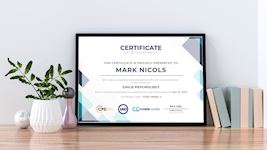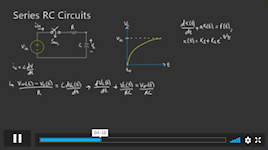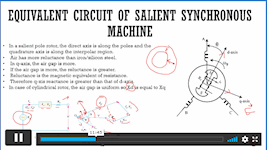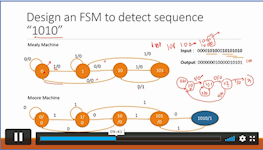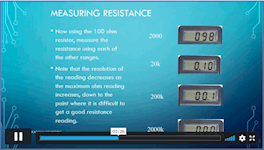Engineering : Electrical Engineering
5 Electrical Engineering Courses Bundle | ***New Year Sale : 5 Free PDF Certificates | Video Lessons | Lifetime Access
Course Cloud
Summary
- Certificate of completion - Free
- Exam(s) / assessment(s) is included in price
- Tutor is available to students
Overview
Bundle Courses on :- Electronic and Electrical Devices | Digital Electronics & Circuit Design | DC & Induction Machines for Electrical Engineering | Electrical Circuits for Power Electrical Engineers | MATLAB Simulation for Power Electrical Engineers**
Explore the basic concepts of Engineering : Electrical Engineering. Learn how electricity is made, get familiar with mostly used electrical devices and components through the eye of electrical engineering in this online course. This Engineering : Electrical Engineering course will buckle you up with the necessary technical and theoretical knowledge required to dive into any electrical engineering profession.
The Engineering : Electrical Engineering course incorporates the fundamental law of electricity, what is voltage, current, and how to measure them using electrical devices and tools. You’ll be familiar with basic electrical signs & symbols, circuit diagrams of potential electrical installations i.e. motors, transformers, or household appliances.
♧♧ Excel your career by enhancing Engineering : Electrical Engineering skills with Course Cloud and get noticed by recruiters in this Hiring season! ♧♧
The Electrical Engineering course will enable you to perform basic electrical testing and maintenance operations required as a professional in this sector. Whether you want to apply for a job in a power plant or work as an electrical design engineer, this Electrical Engineering course spans over a wide area of electrical engineering. While learning theoretical knowledge, the course focuses on developing your practical knowledge.
From learning about digital electronics to power system analysis, the course outlines the real-life implications of that knowledge and skills. You’ll learn how to design and simulate various electrical systems using MATLAB Simulink and implement them in your projects.
In addition, with the Engineering : Electrical Engineering bundle, you get FIVE PDF Certificates Absolutely FREE. Courses included in this Engineering : Electrical Engineering bundle:
- Electrical Engineering Course 01: Electronic and Electrical Devices
- Electrical Engineering Course 02: Digital Electronics and Circuit Design
- Electrical Engineering Course 03: DC and Induction Machines for Electrical Engineering
- Electrical Engineering Course 04: Electrical Circuits for Power Electrical Engineers
- Electrical Engineering Course 05: MATLAB Simulation for Power Electrical Engineers
Once you have completed this electrical engineering course, you’ll have developed a solid understanding of electrical and electronic systems and be ready to dive into the engineering world to pursue your long-cherished career.
On top of that, the electrical engineering course is fully online and self-paced — you can take it anytime, from anywhere. So, enrol now, and give a boost to your career!
Skills You Will Gain:
After completing the electrical engineering course you’ll be able to enrich your knowledge in the following areas —
**Electronic and Electrical Devices
- Get familiar with a wide variety of electrical devices and maintenance tools
- Identify common electronic and electrical components
- Perform troubleshooting, electronic and electrical maintenance tasks
- Know how to test various electrical equipment e.g. fuse, bulb, transformer
**Digital Electronics and Circuit Design
- Learn the fundamental laws and theory of electronics
- Explain digital circuits, logic design, and the symbols in a circuit diagram
- Calculate current, voltage and resistance and other components in a circuit
**DC and Induction Machines for Electrical Engineering
- Define current, voltage, emf, flux linkage, fringing effect and many more
- Understand the working principles of various electrical machines
- Differentiate between generator and alternator, and the units
**Electrical Circuits for Power Electrical Engineers
- Know the difference between AC and DC and their properties
- Define current/voltage source, power, energy, power factor and more
- Explain Ohm’s law, Kirchoff’s Law and a range of circuit
**MATLAB Simulation for Power Electrical Engineers
- Familiarise with various types of semiconductors, rectifiers, converters and inverters
- Learn how to use MATLAB for different types of simulation in power engineering
- Be skilled in designing and developing various electrical systems in MATLAB
Certification
Once you have successfully completed the Engineering : Electrical Engineering course, you will be awarded 5 PDF certificates for FREE as evidence of your achievement. Hardcopy certificates are available for £9.99 each.
Note: Delivery of the hardcopy certificates inside the UK is £4.99 each; international students have to pay a total of £14.99 to get a hardcopy certificate.
CPD
Course media
Description
Curriculum of Electrical Engineering Bundle
*Course 01: Electronic and Electrical Devices*
Section 1: Introduction & Getting Started
- Electrical Engineering: Introduction
- Electrical Engineering: Instructor’s Introduction
Section 2: Electronic and Electrical maintenance Repair
- Electrical Engineering: Becoming a Troubleshooter
Section 3: Tools Needed
- Electrical Engineering: Tools Needed
- Electrical Engineering: Multimeters
- Electrical Engineering: Wire Cutter and Stripper
- Electrical Engineering: Wiring Tools Soldering Iron
- Electrical Engineering: Screw Drivers
- Electrical Engineering: Pliers
- Electrical Engineering: Wrench
- Electrical Engineering: Oscilloscope and Function Generator
Section 4: Electronic Components
- Electrical Engineering: Passive Electronic Components
- Electrical Engineering: Active Electronic Component Diode
- Electrical Engineering: Active Electronic Component Transistor
- Electrical Engineering: Common Electronic and Electrical Components
Section 5: Testing
- Electrical Engineering: Testing a Fuse
- Electrical Engineering: Testing a Bulb or Lamp
- Electrical Engineering: Testing a Switch
- Electrical Engineering: Testing a Transformer
- Electrical Engineering: Testing a Resistance
Section 6: Troubleshooting
- Electrical Engineering: Safety Concerns
- Electrical Engineering: Main Concerns – Maintenance
- Electrical Engineering: Main Concerns – Servicing
- Electrical Engineering: Troubleshooting Part – 1
- Electrical Engineering: Troubleshooting Part – 2
Section 7: Introduction to Electronic Components: A Step by Step Guide
- Electrical Engineering: Introduction
- Electrical Engineering: Voltage Current and Resistance
- Electrical Engineering: Types of Current
- Electrical Engineering: Types of Circuits
...and many more
*Course 02: Digital Electronics and Circuit Design*
Unit 01: Introduction
- Electrical Engineering: Introduction
Unit 02: Chapter 1 - Basic Gates , K Maps and Number Systems
- Electrical Engineering: Chapter 1
- Electrical Engineering: Boolean Laws
- Electrical Engineering: Demorgon’s Laws
- Electrical Engineering: K-Maps – Part 1
- Electrical Engineering: K-Maps – Part 2
- Electrical Engineering: K-Maps – Part 3
...and many more
Unit 03: Sequential Circuits
- Electrical Engineering: Introduction
- Electrical Engineering: Latches and Flipflops
...and many more
*Course 03: DC and Induction Machines for Electrical Engineering*
Unit 1: Introduction to Electric Machines
- Electrical Engineering: Introduction to Electric Machines
- Electrical Engineering: Types of Electric Machines and Principle of Electrical Generation
Unit 2: DC Machines
- Electrical Engineering: Importance and Construction of DC Machines
- Electrical Engineering: Armature Winding and EMF Equation
- Electrical Engineering: Solved Example 1
- Electrical Engineering: Solved Example 2
- Electrical Engineering: Solved Example 3
...and many more
Unit 3: Construction of Transformers
- Electrical Engineering: What is a Transformer
- Electrical Engineering: Importance of Transformer
- Electrical Engineering: Iron Core of Transformer
- Electrical Engineering: Magnetic Circuit Inside Transformer
- Electrical Engineering: Windings of Transformer
...and many more
Unit 4: Fundamentals of Magnetic Circuits
- Electrical Engineering: Introduction to Magnetic Circuits
- Electrical Engineering: Induced Emf and Current
...and many more
Unit 5: Theoretical Part on Transformers
- Electrical Engineering: Introduction to Transformers
- Electrical Engineering: Construction of Transformer
- Electrical Engineering: Theory of Operation
- Electrical Engineering: Ideal Transformer
- Electrical Engineering: Non Ideal Transformer
...and many more
Unit 6: Synchronous Machines
- Electrical Engineering: Construction and Principle of Operation of Synchronous Generator
- Electrical Engineering: Principle of Operation of Synchronous Motor
- Electrical Engineering: Equivalent Circuit and Phasor Diagram of Non Salient Synchronous Machine
- Electrical Engineering: Solved Example 1 on Non Salient Machine
- Electrical Engineering: Solved Example 2 on Non Salient Machine
...and many more
Unit 7: Induction Machines
- Electrical Engineering: Construction and Theory of Operation of Induction Machines
- Electrical Engineering: Equivalent Circuit and Power Flow in Induction Motor
- Electrical Engineering: Torque-Speed Characteristics of Induction Motor
- Electrical Engineering: Solved Example 1 on Induction Motor
...and many more
*Course 04: Electrical Circuits for Power Electrical Engineers*
Introduction to Electric Circuits and Electronics
- Electrical Engineering: Definition of Electric Circuit
- Electrical Engineering: Electric Charge and Electric Current
...and many more
Sources in Electric Circuits and Electronics
- Electrical Engineering: Independent Sources
- Electrical Engineering: Example – Independent Sources
- Electrical Engineering: Dependent Sources
- Electrical Engineering: Example – Dependent Sources
DC Resistive Electric Circuits
- Electrical Engineering: Ohm’s Law
- Electrical Engineering: Example – Ohm’s Law (1 of 2)
...and many more
Nodal Analysis of DC Resistive Electric Circuits
- Electrical Engineering: Definition of Nodal Analysis
- Electrical Engineering: Example – Nodal Analysis with Independent Sources
- Electrical Engineering: Example – Nodal Analysis with Dependent Sources
Loop Analysis of DC Resistive Electric Circuits
- Electrical Engineering: Definition of Loop Analysis
- Electrical Engineering: Example – Loop Analysis with Independent Sources
- Electrical Engineering: Example – Loop Analysis with Dependent Sources
Advanced DC Electric Circuit Analysis Techniques
- Electrical Engineering: Superposition Theorem
- Electrical Engineering: Example – Superposition Theorem
- Electrical Engineering: Thévenin’s Theorem
...and many more
Capacitors and Their Uses in Electric Circuits and Electronics
- Electrical Engineering: Definition of Capacitors
- Electrical Engineering: Charge in a Capacitor
...and many more
Inductors and Their Uses in Electric Circuits and Electronics
- Electrical Engineering: Definition of Inductors
- Electrical Engineering: Current Through an Inductor
...and many more
First Order Transient Electric Circuits
- Electrical Engineering: First-Order Transient Circuits – Introduction
- Electrical Engineering: Series RC Circuits
*Course 05: MATLAB Simulation for Power Electrical Engineers*
Introduction to Semiconductors Used in Power Electronics
- Electrical Engineering: Review of Semiconductors Used in Power Electronics
- Electrical Engineering: Installing Simulink
- Electrical Engineering: Library Browser
- Electrical Engineering: Libraries for Semiconductors
...and many more
Rectifier Simulations in MATLAB/Simulink
- Electrical Engineering: Review of Single-Phase Rectifiers
- Electrical Engineering: Review of Three-Phase Rectifiers
- Electrical Engineering: Libraries for Rectifiers
...and many more
DC-to-DC Converter Simulations in MATLAB/Simulink
- Electrical Engineering: Review of Buck Converters
- Electrical Engineering: Review of Boost Converters
- Electrical Engineering: Review of Buck_Boost Converters
- Electrical Engineering: Creating the Duty Cycle
- Electrical Engineering: Libraries for DC-to-DC Converters
...and many more
Inverter Simulations in MATLAB/Simulink
- Electrical Engineering: Review of Single-Phase Inverters
- Electrical Engineering: Review of Three-Phase Inverters
- Electrical Engineering: Creating the Switch Pulses (Single)
- Electrical Engineering: Creating the Switch Pulses (Three)
- Electrical Engineering: Simulating Single-Phase Inverters
Who is this course for?
The Engineering : Electrical Engineering course is primarily for motivated learners looking to add a new skill to their CV and stand head and shoulders above the competition. Anyone of any academic background can enrol on this Engineering : Electrical Engineering course. However, this Engineering : Electrical Engineering course is preferable for:
- Electrical engineering students planning to enroll or currently enrolled in a power electronics course at a university
- Electrical engineers looking for a refresher course
- Electronics enthusiasts looking for an introductory course on electrical engineering
Requirements
- Must have access to a PC, laptop, tablet or smartphone with Wi-Fi
- There are no specific entry requirements for this Engineering : Electrical Engineering course, which can be studied on a part-time or full-time basis
Career path
Master the necessary skills to take a step closer to success with our Engineering : Electrical Engineering bundle. Enhance your skills and explore opportunities such as —
- Electrical Engineer (£40k - £60k Per Annum)
- Electrical Engineering Technician (£24k - £40k Per Annum)
- Electrical Engineering Lecturer (£25k - £35k Per Annum)
And many more!
Questions and answers
Currently there are no Q&As for this course. Be the first to ask a question.
Certificates
Certificate of completion
Digital certificate - Included
Reviews
Legal information
This course is advertised on reed.co.uk by the Course Provider, whose terms and conditions apply. Purchases are made directly from the Course Provider, and as such, content and materials are supplied by the Course Provider directly. Reed is acting as agent and not reseller in relation to this course. Reed's only responsibility is to facilitate your payment for the course. It is your responsibility to review and agree to the Course Provider's terms and conditions and satisfy yourself as to the suitability of the course you intend to purchase. Reed will not have any responsibility for the content of the course and/or associated materials.

